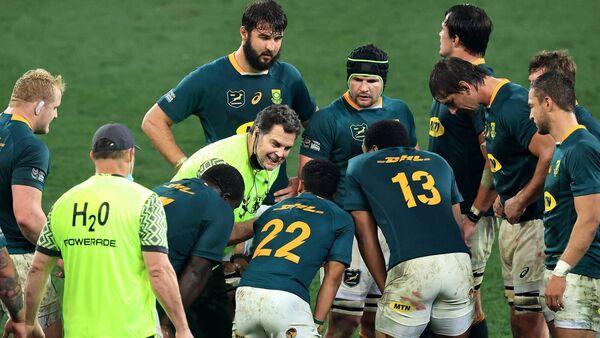At last, we got a real game of rugby. The final Test of the Lions series on Saturday had it all. Maul tries, scrum penalties, and huge hits up front; deft handling, beautiful kicking, and individual brilliance behind. After two games that did more to underline the problems facing elite rugby than showcase its value as a spectator sport, fans got what they had hoped against hope might be delivered — a proper game of ball.
My own enjoyment of the game was heightened by the fact I watched it seated behind 14 South Africans in an Irish bar in Ghent (well worth a visit, if you ever get the chance). They had just finished cycling 229km from Amsterdam, their adopted European home, and were rewarding themselves with pints of Guinness and shorts of brandy as they settled in to get a taste of home, 12,000km away.
“The Dutch took over our country, so now we’re taking over theirs,” laughed one when I asked what their story was.
“Sounds familiar to me,” I replied with a smile. As with any game at this level, there was no shortage of talking points in the aftermath. Much of the chatter focused on the decision to kick to the corner rather than take the points when the Lions were three behind, or Liam Williams’ butchering of a two-on-one that would surely have put Josh Adams under the sticks and his side 14 up in the first half.
These were crucial moments and without a doubt, merited the focus they received at full-time. But to me, the big, game-defining moments came in the form of penalties to South Africa at the scrum in the final quarter, after the entry of Trevor Nyakane.
It underlines the importance of something that’s spoken about rarely in rugby, and team sport in general — perception.
Perception is a powerful thing and some people are preoccupied by it. We all know someone who likes to talk loudly about how well they’re doing at work, what next big thing they are on the cusp of, and so on. And we know when the person in question is more than likely blowing smoke to make us think he’s got it made.
The perception battle happens in sport as well, albeit in a different way. Players and in particular, coaches, will always try to create the perception that they are better than their opponents. This achieves a variety of things.
Internally, it cultivates belief within the playing group. If a coach can convince a squad that they can beat anyone, it gives them a huge psychological edge. When Rassie Erasmus and Jacques Nienaber arrived at Munster in 2016, we were coming off the back of two very tough seasons. We were clearly lacking belief and they placed a huge emphasis on developing that in us again.
Positive affirmation after positive affirmation, a couple of months in and we were fully convinced we could beat anyone. When the lads were getting ready to play Saracens in the Champions Cup semi-final in May of that season, I had no doubt in my mind that we would come out on top.
This perception can rub off on opponents as well. If you have even the most miniscule doubt in your head that you won’t beat your opposition, it can manifest in all sorts of catastrophic ways. The doubt might not even be a conscious one, but rugby is littered with examples of underdogs throwing away golden opportunities to win matches by falling apart at crucial times.
An example from my time in Grenoble sticks out in my mind. It was Christmas 2018. We had a heroic win at home to Montpellier on December 22 and our next fixture was away to Stade Francais on the 29th.
The general consensus was we wouldn’t have a hope of winning away in Paris, so we were given four consecutive days off and reassembled on the 27th (after much festive eating and drinking, one would assume) to get ready for the trip to the capital.
Far from being blown away, it seemed the Parisiens were after having a far jollier Christmas than we did. We were 17 points up after 20 minutes, and couldn’t believe what was happening. I was on the bench that day, and we were all giddy with excitement. In the second half, however, we managed to throw the game away. Making one calamitous error after another, we torpedoed our chance of a famous away win.
You could argue that the turkey and wine caught up on us eventually, but did it really? Or did we just believe that Stade Francais were a better side that we couldn’t beat in their own backyard?
If you look at how many times Munster have fallen just short against Leinster in recent years, it would be narrow-minded to think psychology hasn’t played a significant role there as well.
The final way perception can influence proceedings is through the match officials.
Players and coaches are constantly trying to gain a subtle edge with the referee. As a Munster front row, every time the ref would talk to us in the dressing room before games, we would say ‘we want to stay square…we are going to give you a good picture’.
Immediately, you are telling the ref that you are going to abide by the laws and if there are any shenanigans, it’s certainly not your team that is responsible.
One of the funnier ways you see this on the field is when a maul crashes over the line and the referee can’t see if the ball has been grounded. If this happened the previous weekend, Anthony Foley would pause the clip during the Monday video review and chastise anyone who hadn’t leapt about like the 50-1 shot they had backed after eight pints at the Galway Races had romped home and paid for the rest of the weekend.
South Africa’s bomb squad is a terrific example of something that does all three. When the Springbok camp talk up the bomb squad at every opportunity, it’s not just designed to give the men in question a well-deserved public pat on the back. It sends a signal to the opposition and the referee that when these guys take to the field, carnage is going to ensue.
So, when they arrive, the Springboks think ‘excellent’, their opponents think ‘oh shit’ and the referee thinks ‘this should be interesting’. That’s what happened on Saturday when Nyakane entered the fray. Having been underwhelming the first week, the bomb squad front row of Nyakane, Marx and Koch obliterated the Lions scrum at the end of the second Test.
Undoubtedly, this was in Mathieu Raynal’s mind as the sides packed down for a five-metre scrum after Mako Vunipola was held up in the 70th minute. The bomb squad is here, so they’re probably going to do what the bomb squad does. The scrum collapsed, the penalty went South Africa’s way, and the Lions saw another golden opportunity to score snatched away from them.
Kyle Sinckler is no stranger to giving out to referees when a call goes against him but on this occasion, he was correct to point out that Nyakane was hinging.
Under pressure from Sinckler, Nyakane dropped his neck toward his knees, causing Sinckler to pancake on the ground. It’s usually a clearcut decision these days but, having seen Nyakame and co demolish their opposite numbers the previous week, it’s quite possible Raynal gave him the benefit of the doubt.
Similarly in the last play of the game, the Lions had a final chance to disrupt the Springbok scrum and level the game. This time, Koch hinged on the tighthead side, Vunipola went down, and Raynal gave the Springboks another penalty.
Decisions at scrum time are made on very fine margins at the best of times, so the perception of even the slightest edge in the mind of the referee can be the difference between winning and losing.
Rassie is about to face the wrath of World Rugby for that hour-long video, which was unprecedented, and most definitely out of order. You look at Jasper Wiese failing to claim Ali Price’s box kick, however, leading directly to Cheslin Kolbe’s magnificent finish, and you wonder whether the try would have stood had that video not been released.
Maybe it would, maybe it wouldn’t. One thing’s for sure, in the battle of perception across this series, the South Africans came out on top.

